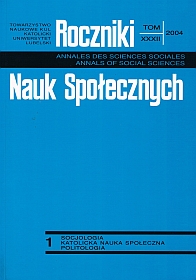Przekraczanie granic kulturowych w epoce globalizmu. Niektóre ścieżki interakcyjne w Australii (przeł. Jan Kłos)
Abstrakt
The paper analyses the problem of ethnicity with respect to globalising processes ongoing in contemporary societies. The author puts forward a thesis that there is an influence of global interculturalism that transcends national ties and crossing over cultural borders. The course of these phenomena is analysed within the context of the circumstances of the Australian state. A particular stress is laid on the issue of building a multicultural nation by the multiethnic society of Australia. This multicultural nation is a new value. At the same time the paper depicts achievements and failures in the multicultural policy assumed and carried out in this country.
Bibliografia
Armstrong J. A. (1982): Nations before Nationalism, Chapel Hill: University of Northern California Press.
Bourke C., Bourke E., Edwards B. (wyd.) (1994): Aboriginal Australia, St Lucia: University of Queensland Press.
Komitet Doradczy Stulecia Federacji 2001 (1994), A Report to the Council of Australian Governments by the Centenary Advisory Committee, Canberra: Australian Publishing Service.
Clyne M. (1982): Multilingual Australia, Melbourne: River Seine.
Clyne M. (1991): Community Language: The Australian Experience, Cambridge: Cambridge University Press.
Clyne M. (1997): Language policy in Australia: achievements, disappointments, prospects, „Journal of Intercultural Studies”, t. 18, nr 1, s.63-71.
Clyne M., Kipp S. (1996): Language Maintenance and Language Shift in Australia, 1991, „Australian Review of Applied Linguistics”, t. 19, nr1, s.1-9.
Connor K. N. i in. (1990): Beyond reason: the nature of the ethnonational bond, „Ethnic and Racial Studies”, t. 2, nr 3, s. 373-389.
Conzen K. N. i in. (1990): The invention of ethnicity: a perspective from the USA, „Altreitalie”, t. 2, nr 3, s. 37-62.
Davies N. (1996): Europe − a History, Oxford: Oxford University Press.
Davies N. (1997): West best, East beast, „Oxford Today”, t. 9, nr 2, s.28-31.
Deane W., Sir (1997): Multiculturalism our Australian way, „Multicultural Life” (Adelaide), nr 2, s. 3.
Eisenstadt S. (1997): Introductory Address, Światowy Kongress Międzynarodowego Instytutu Socjologii, Kolonia, Niemcy.
Eurobarometer, 1971-1997: Public Opinion in the European Community, s.1-46.
Gellner E. A. (1983): Nations and Nationalism, Oxford: Basil Blackwell.
Grant N. (1997): Democracy and cultural pluralism: towards the 21st century, [w:] R.Watts, J. J. Smolicz, (wyd.): Cultural Democracy and Ethnic Pluralism, Frankfurt am M.: Peter Lang, s. 25-50.
Hudson D. (1995): Cultural Becoming in a Multicultural Australia, rozprawa doktorska przedstawiona na Wydziale Pedagogiki, Uniwersytet Adelajdy.
Jupp J. (1988): The Australian People: an Encyclopedia of the Nation, its People and their Origins, Sydney−London: Angus and Robertson.
Kipp S., Clyne M., Pnawels A. (1995): Immigration and Australia's Language Resources, Canberra: Australian Government Publishing Service.
Kłoskowska A. (1996): Kultury narodowe u korzeni, Warszawa: PWN.
Kłoskowska A. (1997): Skąd i po co naród?, „Znak”, t. 49, nr 502, s.69-78.
LoBianco J. (1987): National Policy on Languages, Canberra: Commonwealth Department of Education, Australian Government Publishing Service.
Mylecharane S. (1997): 1996 Census: a multicultural perspective, „Multicultural Marketing News”, nr 45, s. 6.
Secombe M. J. (1997): Cultural Interaction in the Experience of Some „Mainstream” Australian Graduates of Anglo-Celtic Cultural Background, rozprawa doktorska przedstawiona na Wydziale Pedagogiki, Uniwersytet Adelajdy.
Smith A. D. (1984): Ethnic persistence of national transformation”, „The British Journal of Sociology”, t. 35, nr 3, s.452-460.
Smith A. D. (1986): The Ethnic Origin of Nations, London: Basil Blackwell.
Smolicz J. J. (1974): The concept of tradition: a humanistic interpretation, „Australian and New Zealand Journal of Sociology”, t. 10, nr 1, s.17-23.
Smolicz J. J. (1988): Core values and cultural identity, „Ethnic and Racial Studies”, t.4, nr 1, s.75-90.
Smolicz J. J. (1988): Tradition, core values and intercultural development in plural societies, „Ethnic and Racial Studies”, t. 11, nr 4, s.387-410.
Smolicz J. J. (1991): Language core values in a multicultural setting, „International Review of Education”, t. 37, nr 1, s. 35-52.
Smolicz J. J. (1995): Language − a bridge or a barrier? Languages and education in Australia from an intercultural perspective, „Multilingua”, t.14, nr 2, s.151-182.
Smolicz J. J. (1997): Australia: from migrant country to multicultural nation”, „International Migration Review”, t. 31, nr 117, s.171-186.
Smolicz J. J., Secombe M. J. (1989): Types of language activation and evaluation in an ethnically plural society, [w:] U. Ammon (wyd.), Status and Function of Languages and Language Varieties, Berlin−Nowy Jork: Mouton de Gruyter, s. 478-514.
Szacki J. (1969): Three concepts of tradition, „Polish Sociological Bulletin”, t.2, s.144-150.
Zialcita F. N. (1995): State formation, colonisation and national identity in Vietnam and the Philippines, „Philippine Quartely of Culture and Society”, t.23, s.77-117.
Copyright (c) 2004 Roczniki Nauk Społecznych

Utwór dostępny jest na licencji Creative Commons Uznanie autorstwa – Użycie niekomercyjne – Bez utworów zależnych 4.0 Międzynarodowe.


